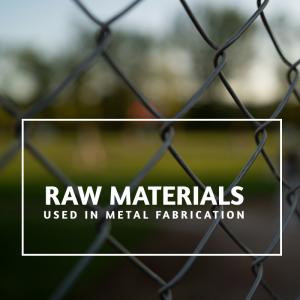09-09-2019
Raw Materials Used in Metal Fabrication

A metal fabrication shop will use a variety of raw materials depending on the specificity of application and project needs set by the client. Certain raw materials are better suited for certain projects, and an informed selection effectively serves to reduce cycle times while also maximizing workflow. As such – it is beneficial to cultivate a general understanding of the appropriate use of raw materials based on categorical application.
Today we’ll delve into 4 basic categories of raw materials referred to by metal fabrication shops.
Hardware Raw Materials
- Hardware raw materials are known as any variety of standardized fittings and parts used to make the final product tougher and more durable – yet easier to work with
- Common examples of hardware metals include: corners, handles, locks, keys, latches, chains, and wires
Sectional Metal Raw Materials
- Sectional metal raw materials are commonly used construction and engineering industrial applications
- ASTM International (previously known as the American Society for Testing and Materials) sets the parameters for determining the physical and chemical properties of sectional metals
- Common examples of sectional metals include: I-beams, Z-shapes, hollow structural sections (HSS), bars, and rods
Flat Metal Raw Materials
- As its name suggests, flat metal raw materials are pressed or rolled into flat components with varying thickness depending on application
- The thickness of flat metals is measured by metal fabrication shops as gauges, and can be further broken down into three sub-categories based on gauge thickness: foil metal (metals with the thinnest thickness), sheet metal (standard or general thickness of less than 6mm by size), and plate metal (metals that are thicker than 0.25 inches)
Formed and Expanded Metal Raw Materials
- Formed and expanded metals go through a process of shearing that result in consistent diamond-shaped perforated holes defined by thicker threads of metal (similar to that of a standard metal wire fence)
- Common applications of formed and expanded metals include: exterior fencing, outdoor furniture, architectural detailing, screen doors, and safety enclosures
Useful read! Thanks for distinguishing the various categories! Super helpful
Posted by: Keeran | September 9, 2019, 12:54 pm

*** Your email address will not be published.






